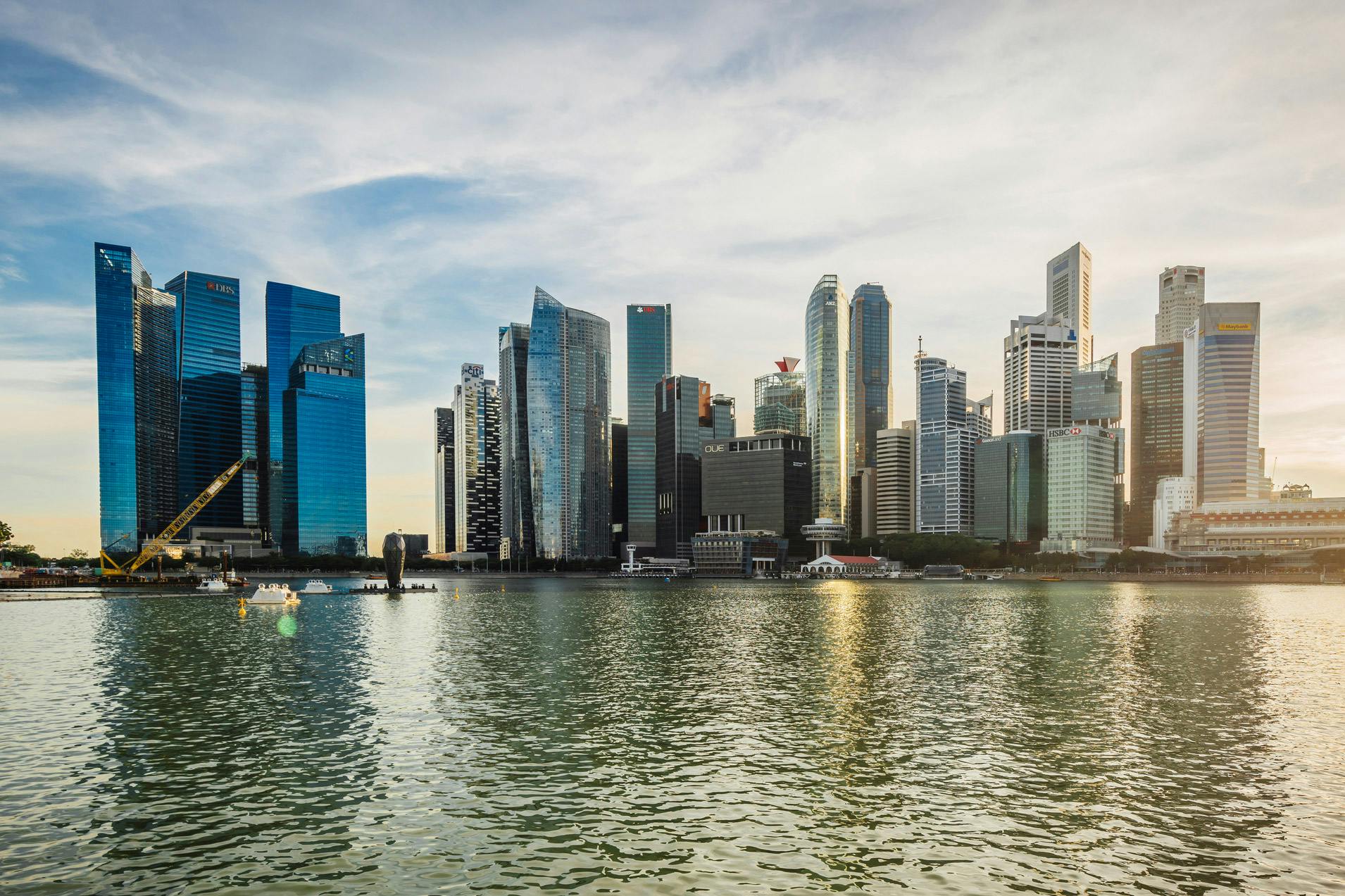Work in Singapore
Singapore's strong economy, reputation for safety, and excellence in healthcare offer workers a high quality of life
In addition to its robust economy and job market, Singapore is a great place to live. It is known for its cleanliness, transport efficiency, diverse population, and unique culture. As a bonus, its location in Southeast Asia makes it an ideal base for exploring surrounding countries, such as Malaysia and Indonesia, as well as the rest of the continent.
Jobs in Singapore
Singapore has a successful free-market economy and consistently ranks among the least corrupt nations in the world. Unemployment is low, and its port is one of the busiest in the world.
Exports, such as electronics, chemicals, scientific instruments, pharmaceuticals, and processed food and beverages, are vital to the economy. The country also relies heavily on its transportation, business, and financial services sectors, with the strongest labour markets predicted to be the energy and utilities sector, communication services and the financials and real estate sectors.
Singapore's workforce is extremely multicultural, comprising Chinese, Malay, and Indian workers, as well as expatriates from all over the world. While the government has taken steps to reduce the country's reliance on foreign labour, particularly in unskilled roles, Singapore remains an open and diverse society that attracts many graduate international workers .
Singapore's government is committed to attracting and retaining foreign labour, with policies and initiatives to make it easier for international talent to live and work in Singapore. This includes the Overseas Network & Expertise Pass, which allows high-earners and achievers to live in Singapore without securing employment first.
International companies with operations in Singapore include:
- Accenture
- AXA
- BNP Paribas
- Citibank
- Deloitte
- Deutsche Bank
- EY
- ExxonMobil
- GlaxoSmithKline
- HSBC
- IBM
- InterContinental Hotels Group
- Johnson & Johnson
- KPMG
- Novartis
- PwC
- Proctor & Gamble
- Shell
- Siemens.
Popular graduate jobs
- chemicals
- electronics
- financial services
- processed food and beverages
- ship repair
- telecommunications equipment
Skills shortages
According to the Manpower Group's 2023 Talent Shortage Survey, Singaporean employers say they are struggling to find candidates with the right combination of hard and soft skills.
The report states that the following sectors are experiencing a talent shortage:
- healthcare and life sciences
- consumer goods and services
- information technology
- industrials and materials
- transport, logistics and automotive.

How to get a job in Singapore
You do not need to be based in Singapore to apply for jobs - many websites allow you to search for work and apply online. Useful job sites include:
You can apply for jobs in Singapore online, but it's important to check company websites for specific application instructions. Some companies may require you to submit a CV and cover letter, while others may ask you to complete an online application form.
You may also want to consider networking with people in your field who live in Singapore. This can be a great way to learn more about the job market and to get your foot in the door with potential employers. Registering with recruitment agencies is another good way to find job openings in the country.
If you're not in Singapore, initial interviews may be held via phone or video. However, keep in mind that large multinational companies may require you to attend an assessment centre in person.
English is the main language of business in Singapore, so all applications and interviews will be conducted in English. You must secure a job offer before you can apply for a work permit.
Summer jobs
If you're looking for work in Singapore, the country is a tourism hotspot, so you may be able to find casual work in hotels, hostels, bars, and restaurants. However, keep in mind that these jobs may be competitive and may not pay well.
If you're aged between 18 and 25, the Singapore Work Holiday Programme allows university students and recent graduates from 11 countries (including the UK) to work in the country for up to six months on a holiday visa. This is a great option for gaining work experience in Singapore and exploring the country.
You can also find volunteer opportunities in Singapore. There are various projects to get involved in, from working with children and the elderly to tackling community issues. You can also work on animal conservation, environmental, health, social care, sports, or education projects.
For volunteering opportunities in Singapore, see:
If you're looking for a more permanent job in Singapore, you'll need to apply for a work permit. To do this, you'll need to secure a job offer from a Singaporean employer. Once you have a job offer, you can apply for a work permit through the Ministry of Manpower.
Teaching jobs
English is the official language of education and business in Singapore, so if you're a native or proficient speaker you'll be able to teach in the country.
To work in public schools, you'll need to be approved by the Ministry of Education Singapore, while the large expat community means there are also opportunities in foreign schools. You'll usually need a Bachelors degree and a teaching qualification to be considered. The National Institute of Education - Singapore is the only teacher training centre in the country.
Despite English being widely spoken there is a demand for TEFL teachers, although jobs aren't as widespread as in other Asian countries. To teach English as a foreign language, you'll usually need a TEFL qualification and some previous teaching experience. Some companies may also require you to have a Bachelors degree.
The school year begins in January, with a month-long holiday in June. Teachers are generally hired to start training in July.
It's also possible to teach English in Singapore with the British Council.
Internships
Competition for internships and work experience opportunities is fierce. Be proactive and arrange placements directly with companies. You should also consider applying speculatively, as many opportunities aren't advertised. Keep checking the websites of the organisations you're interested in for any intern vacancies that occur.
InternSG is a useful resource.
You could also complete an internship as part of the Singapore Work Holiday Programme.
In addition, AIESEC (Association Internationale des Etudiants en Sciences Economiques et Commerciales) provides students with training and internship opportunities at for-profit and non-profit organisations.
Singaporean visas
All foreigners who want to work in Singapore must have a valid pass or work visa.
There are a variety of passes, which one you need depends on your circumstances and level of skill. Types of pass include:
- Employment Pass - for foreign professionals, managers and executives. You'll need to earn at least S$5,000 (£2,997) a month and have acceptable qualifications.
- EntrePass - for foreign entrepreneurs wanting to start a business in the country.
- Personalised Employment Pass - for high earners.
- Work Permit for Migrant Worker - for semi-skilled international workers. For example, those in the construction or manufacturing industries.
- Work Permit for Foreign Domestic Workers
- Work Permit for a Performing Artiste
- S Pass - for mid-level skilled workers. You'll need to earn at least S$3,150 (£1,888) a month and meet the assessment criteria.
- Training Employment Pass - for foreign professionals undergoing practical training.
- Work Holiday Pass - for students and graduates aged between 18-25 who want to work and holiday in Singapore for six months.
- Miscellaneous Work Pass - for those taking on a short-term work assignment of up to 60 days.
For more information about passes and eligibility criteria, visit the Ministry of Manpower (MOM).
If you're not from the UK, contact the Singaporean embassy in your home country for information about work passes, visas and permits.

Language requirements
Singapore has four official languages - English, Malay, Mandarin, and Tamil. Most Singaporeans are multilingual, and English is the language of business and education. If English is not your native language, you may need to prove your proficiency for some jobs.
How to explain your qualifications to employers
UK qualifications are widely recognised in Singapore, and the education systems of the two countries are similar, so explaining your degree should not be a problem. Additionally, Singapore's cosmopolitan workforce means that employers are accustomed to dealing with applicants with qualifications from other countries.
However, it is always best to check with the employer before applying for a job.
To find out more about the recognition of qualifications, see ENIC-NARIC.
What it's like to work in Singapore
Most businesses operate between the hours of 9am and 6pm, with Monday to Friday as the standard working week.
Employees are entitled to eleven holidays per year, rising to 14 days depending on length of service and seniority. There are also the following public holidays:
- New Year's Day
- Chinese New Year (two days)
- Good Friday
- Labour Day
- Vesak Day
- Hari Raya Puasa
- National Day
- Hari Raya Haji
- Deepavali
- Christmas Day.
While salaries are competitive, the cost of living in Singapore is high when compared to other Asian countries.
For more information on working conditions, visit the Singaporean Ministry of Manpower (MOM) - Employment Practices.
Find out more
- Discover what it's like to study in Singapore.

